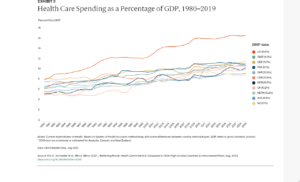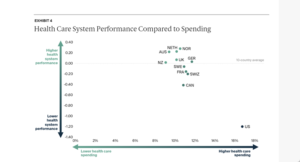Marty Levine
8/9/21
We have just received a new picture of our nation’s health care system from a new Commonweal Fund report, Mirror, Mirror 2021: Reflecting Poorly.

Remember, this is the health care system we have all depended on in this time of COVID-19. This is the health care system we are arguing about when we debated the Affordable Care Act (ACA or “Obamacare”) and when we are debating the wisdom of “Medicare for All.” This is the health care system that we have built over decades of belief that health care and the marketplace are a match made in heaven.
When we say that we are committed to protecting the health of our people we have been willing to put our money behind our word. As a nation, we spend much more on treating and preventing illness than other countries. “The U.S. continues to outspend other nations on health care, devoting nearly twice as much of its GDP as the average Organization for Economic Co-operation and Development (OECD) member country. U.S. health spending reached nearly 17 percent of GDP in 2019, far above the 10 other countries compared in this report. Moreover, high U.S. out-of-pocket health spending per person, the second-highest in the OECD…”

But, for a nation that prides itself on our excellence, on our exceptionalism, we have not used our money very wisely. Comparing our results to other developed countries we are not getting the bang for our buck we should expect. If this were a meal from a highly touted restaurant, we’d be online posting our “0-star” rating everywhere we could. If this was a product, we had ordered on Amazon we’d be sending it back.

“The U.S. ranks last overall on the health care outcomes…On nine of the 10 component measures, U.S. performance is lowest among the countries…including having the highest infant mortality rate (5.7 deaths per 1,000 live births) and lowest life expectancy at age 60 (23.1 years). The U.S. ranks last on the mortality measures included in this report, with the exception of 30-day in-hospital mortality following stroke. The U.S. rate of preventable mortality (177 deaths per 100,000 population) is more than double the best-performing country, Switzerland (83 deaths per 100,000)…Maternal mortality is one: the U.S. rate of 17.4 deaths per 100,000 live births is twice that of France, the country with the next-highest rate (7.6 deaths per 100,000 live births)…all countries reduced their rate of avoidable mortality over 10 years, but the U.S., with the highest level in 2007, reduced it by the least amount — 5 percent reduction in deaths per 100,000 population by 2017 — compared to 25 percent in Switzerland (by 2017) and 24 percent in Norway (by 2016).”
Unlike every other nation in this study, we do not have a universal health care system. All their populations can gain access to the care they need through the same door. In our country, responsibility is personal, not collective. We have chosen to approach healthcare as a product to be purchased or a benefit that some may merit, but not as right. The result is a complex web of plans and health care pathways that, when taken together just don’t seem to work very well.
And, to add insult to injury, our national “system” is not very cost-effective.
According to data compiled by the Kaiser Family Foundation, almost half of the nation (158 million) get health coverage through employer-sponsored health insurance that is purchased on the open market. About 25 million seniors and disabled adults “merit” Medicare. About 45 million have incomes low enough to qualify for health care through each state’s differing adaptation of Medicaid. Nineteen million others buy coverage individually. And 30 million fall through the cracks and rely on emergency rooms, free clinics, individual acts of kindness or they just do without care.
Does this picture suggest that our national approach is best in class? Should it be pushing us to learn from them and quickly adapting their best practices? Why are still fighting over the American Care Act (ACA) which sought to tweak rather than revamp our approach?
This is one more example of the fantasy of personal responsibility overwhelms facts. The same voices that have made wearing a mask an issue to go to battle; the same voices who have made vaccinations problematic have spent decades railing against the ills of socialized medicine. They refuse to look at data and learn from our experience. They seem willing to sacrifice their supporters in order to ignore the failure of their strategy.
Until we can move beyond this empty tug of war, we as a nation will remain stuck. We will continue to spend too much for too little. We will continue to cast those without the right job or without enough income aside, leaving for them only a few healthcare scraps. And we will continue to scratch our heads when researchers tell us our life expectancy is decreasing or that we lead the world in infant mortality.

I’ve been following this blog for years and it’s amazing to see how much it has grown and evolved Congratulations on all your success!